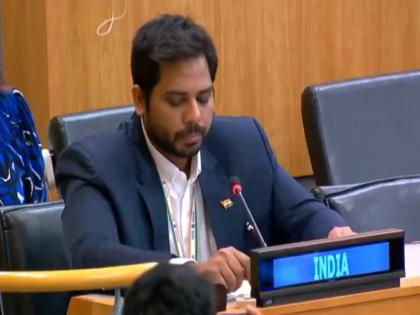Congress MP Gaddam Vamsi Krishna reiterates India's support for "rules-based, fair and equitable" WTO system at UNGA
By ANI | Updated: October 10, 2025 04:30 IST2025-10-10T04:27:53+5:302025-10-10T04:30:05+5:30
New York [US], October 10 : Congress MP Gaddam Vamsi Krishna has reaffirmed India's support for a "rules-based, fair ...

Congress MP Gaddam Vamsi Krishna reiterates India's support for "rules-based, fair and equitable" WTO system at UNGA
New York [US], October 10 : Congress MP Gaddam Vamsi Krishna has reaffirmed India's support for a "rules-based, fair and equitable" multilateral trading system under the World Trade Organisation (WTO).
Representing India at the United Nations General Assembly (UNGA) as part of the Parliamentary Delegation, Krishna delivered India's statement in the Second Committee's General Discussion on Macroeconomic Policy Questions and the outcomes of the International Conferences on Financing for Development on Thursday.
"We meet at a time when the international financial system remains under severe stress with weak growth, unsustainable debts and declining external flows. The adoption of the Sevilla commitment provides a renewed global framework to address these challenges. On international trade, India reiterates its support for a rules-based, fair, open, transparent, inclusive, non-discriminatory, and equitable multilateral trading system under the WTO," Krishna said.
Highlighting that trade serves as an engine for inclusive development, enabling the fair participation of developing countries, the Congress MP expressed concerns over the "continuing impasse" in the selection process for new appellate body members, which has undermined the dispute settlement system and the rights of all members.
"Trade must serve as an engine for inclusive development, supporting commodity-dependent economies and enabling fair participation of developing countries in global value chains. We are therefore concerned at the continuing impasse in the selection process for new appellate body members, which has severely undermined the dispute settlement system and the rights and obligations of all members," Krishna said.
A delegation of Indian parliamentarians arrived in New York City on Tuesday (local time) to represent India's stance at the UNGA session.
The first batch of the Non-Official Delegation is being led by BJP MP and Chairperson of the Joint Parliamentary Committee on One Nation One Election, PP Chaudhary. This group, comprising 15 Members of Parliament from various political parties, will be in New York from October 8 to 14.
A second group of 15 MPs is scheduled to attend the UNGA towards the end of October. The delegations will represent a wide range of political parties, showing India's commitment to bipartisan participation in global forums.
According to official releases, the Non-Official Delegation allows MPs to attend UN sessions, engage with India's Permanent Mission, and present India's democratic voice on international issues. The initiative reflects India's growing global role and the importance it places on parliamentary diplomacy.
Samajwadi Party MP Rajeev Rai stated that the "unofficial" delegation comprises members from several political parties, thereby ensuring a balanced representation of India's parliamentary diversity.
The first group includes P P Chaudhary (Leader), Anil Baluni, Captain Brijesh Chowta, Dr. Nishikant Dubey, Ujjwal Deorao Nikam, S Phangnon Konyak, Dr Medha Vishram Kulkarni, Poonam Ben Maadam, Vamsi Krishna Gaddam, Vivek Tankha, Dr T Sumathy, Sribharat Mathukumilli, Kumari Selja, N K Premachandran, and Rajeev Rai.
The second group will include D. Purandeswari, Vishnu Datt Sharma, Bhola Singh, Dilip Saikia, Saumitra Khan, Rekha Sharma, Sajda Ahmed, P Wilson, PV Mithun Reddy, Indra Hang Subba, Joyanta Basumatary, Sandeep Kumar Pathak, Niranjan Bishi, Manoj Kumar Jha, and GK Vasan.
The UNGA is the main decision-making and representative body of the United Nations, where all 193 member states have equal participation. It addresses global issues, adopts resolutions, and oversees subsidiary bodies that address specific international challenges.
India has a long history of sending parliamentary delegations to the UNGA, a practice that stopped in 2004. In the past, senior leaders like LK Advani and Atal Bihari Vajpayee represented India at the forum.
Disclaimer: This post has been auto-published from an agency feed without any modifications to the text and has not been reviewed by an editor
Open in app